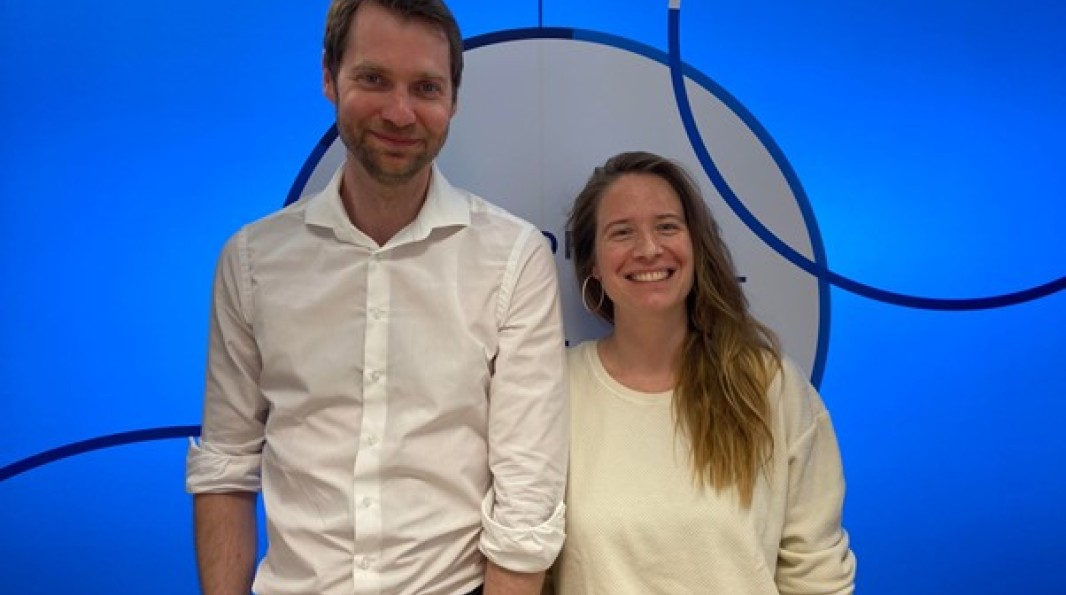Nicolas Brunn and Manon Vigoureux come respectively from the EDF Group's Business Division, and more specifically the Sourcing Economy Finance Division and the Auvergne-Rhône Alpes Regional Division. Together, they lead the Neutre.eco project. In May 2024, they entered the MATCH phase of the EDF Pulse Incubation entrepreneurial programme. This second phase, out of a total of four stages, will enable them to assess the commercial feasibility of the project. Today, they take a look back at their journey, to explain their offer and future plans.

Can you explain the Neutre.eco project?
Nicolas – When you buy a product (whether it's a steel beam or an office table), you generally know how much it costs, and you have access to technical data about the product (its size, material, weight, etc.). However, buyers still have no information on the environmental impact of their purchases. Neutre.eco aims to give these products a rating from an environmental point of view, in order to reward suppliers who make efforts to reduce carbon emissions when making B2B purchases. This rating takes into account CO2 emissions, water management and biodiversity by asking key questions to which suppliers have the answers. Our aim is to provide buyers with all the information they need to judge the quality and environmental impact of what they buy.
You've just completed the incubator's START phase. What have you learnt?
Manon – I've learnt a lot about the financial dimension of projects to create subsidiaries: the minimum size that the market in which the subsidiary operates must be for it to be interesting for EDF, the growth prospects linked to the dynamics of the players in the sector, the share of this market targeted by our environmental rating service and the cost structure to be mobilised to achieve this objective. Before the START phase, I concentrated more on listening to our customers' needs and finding the best way to meet them.
Nicolas – For my part, I learnt a lot about the customer aspect. We interviewed around fifty prospects in the space of a year. I've had time to perfect these interviews so that I can fully understand their needs and offer them relevant solutions.
You've just joined the MATCH phase of EDF Pulse Incubation, which is the second stage of the incubator process. What are Neutre.eco's objectives and challenges now?
Manon - In the START phase, we demonstrated the existence of a market large enough to create a subsidiary and our ability to meet the needs of our future customers. In the MATCH phase, we now need to prove the commercial feasibility of our project, firstly by demonstrating our ability to sign up customers using a low-cost go to market strategy. Then we'll prove the technical feasibility of industrialising our methodology.
What advice would you give to someone who wants to take the plunge?
Nicolas - My advice would be to concentrate first on how to contact prospects. Often, we have ideas and we think we're right, so we try to build a business model around those ideas, spending a lot of time on it. However, we often only have a small network to validate or invalidate our hypothesis. People tend to think: "I've got my network and I've asked friends of friends to provide me with leads or challenge me."
At the moment, I'm devoting a lot of energy to developing a tool or a script that will make it easy to generate calls to challenge our ideas. The acquisition channels need to be established before the business model, before the value proposition, before everything else. Without that, you're building on sand.
For those who want to embark on the adventure of an incubator, it's perfect if they're in their field of expertise. But if that's not the case, I'd strongly advise them to think about these issues before applying, because that's what will determine what happens next.
Manon – My advice would be more about analysing the competition. We're working on it at the moment, when we should have been looking at it at the start of the project. To look ahead 5 years, you need to have two or three very strong convictions about the dynamics of the sector, which you can rely on to protect your position in the market.
A final word?
Manon - We're very lucky to have the support of our respective entities. So I'd like to take this opportunity to thank Frédéric Sarrazin, Elodie Babkine and Capucine Dechelette for their support.
Nicolas - That's right, we'd like to thank our managers for letting us live this adventure and for supporting us in it. My warmest thanks go to Bertrand Waldner, without whom none of this would have been possible.

